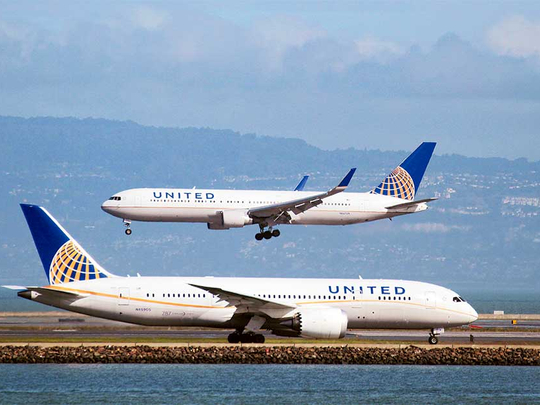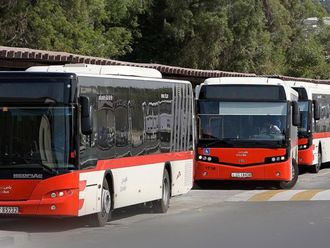
Dubai: The now world-famous case of a man being dragged off a United Airlines flight seems to beg the question: just what are my rights as a passenger?
Footage taken on-board a United Airlines flight from Chicago showed a bloodied David Dao, an American doctor, forcibly dragged off the plane by airport security.
His abrupt removal was to make way for four United crew members who the airline said “needed” to be on the flight.
While the video might shock many who are surprised just how far an airline can go to bump a passenger off a flight, industry experts seem to suggest that it’s well within the airline’s rights.
The global trade body of airlines, the International Air Transport Association (IATA) says on one its website that a “seat will not be available on a flight even if you have a confirmed reservation.”
While laws in each country vary, the IATA notes, “in most circumstances, if you are denied boarding involuntarily, you are entitled to compensation.”
At time, the airline must “solicit volunteers” — in other words, ask for a show of hands from passengers who don’t mind being delayed.
As every traveller knows, to buy a ticket, get through multiple airport checkpoints and then — finally — get on the plane is a complicated process.
Upon buying a ticket, airlines nearly always issue a list of terms and conditions generally referred to as the “conditions of carriage.”
In the UAE, all major carriers — Emirates, Etihad, Flydubai, and Air Arabia- are among the IATA’s 274-member roster, which means that their conditions of carriage follow similar lines.
Emirate’s own condition of carriage notes “[in case of overbooking] the airline will deny boarding to other persons in accordance with its particular boarding priority.”
“With few exceptions, persons denied boarding involuntarily are entitled to compensation.”
A matter of discretion
Etihad’s conditions of carriage, meanwhile, contain no less than 21 terms under which you and your baggage will be allowed to fly — under the “reasonable exercise of our discretion.”
Some carriers have a very wide spectrum of discretion. Late last month, United Airlines — the same carrier that had the passenger forcibly removed this week — denied boarding to two girls who were wearing leggings.
The reason the airline gave to block the girls from their flight from Denver to Minneapolis was that the two girls were not “properly clothed.”
In certain jurisdictions, passengers have more clearly defined rights.
For flights departing, arriving or travelling within the 28 member states of the European Union, passengers who are denied boarding because of overbooked flights are entitled to cash compensation.
The level of compensation depends on flight distance — from Dh970 for shorter distances, all the way up to Dh2,330.
Additionally, travellers who are victims of either overbooking or cancellations are also entitled to meals and refreshments, hotel accommodation, transport, and free phone calls or emails, depending on the length of time delayed.
A question of priorities
While the small print varies between airlines, all terms and conditions have one goal in common, according to Martin Rivers, a UK-based aviation analyst.
“They all basically cover themselves for unforeseen circumstances that might, otherwise, oblige them to pay huge sums for breach of contract,” Rivers told Gulf News.
“Most passengers aren’t really aware of this as it’s buried in the small print. But the scope of the get-out clauses is massive.”
There’s no guarantee, for example, that you will actually travel on the flight number stated in your ticket, he said. This is because airlines know that making such a guarantee would leave them heavily exposed to compensation payouts “in the event of adverse weather or other disruptive events.”
However, in the case of United Airlines, an attempt to fix an overbooked flight played out disastrously for all involved, the analyst said.
“In United’s case, it manifested as an unfortunate and frankly rather stupid attempt to prioritise repositioning their staff over serving their customers.”
So what can passengers do to ensure their rights? “In essence, do your research beforehand, Rivers said.
“The best advice I can give is don’t trust the airline to do the right thing — Google your rights and if necessary seek assistance in filing a claim.”
An unlikely comparison: flying and fruit shopping
IATA, a global airline trade body with 274 carriers, asks people to think of their rights as passengers as if they were buying avocados at a shop.
“Imagine the stores had to guarantee the freshness of the fruit for 5 days after purchase, and if not, pay a fine or compensation to consumers (as airlines have to pay fines today),” the text of an IATA document reads.
If supermarkets were regulated, like airlines are in the United States alone, they would have to shell out US$5,000 for every avocado that spoils within 5 days, the document states.
Following the analogy forward, the IATA believes that airlines have a raw deal — threatened by authorities all-to-willing to fine airlines that do not run smoothly.
And the airlines have no choice other than to pass on the costs to passengers, according to the trade body.












